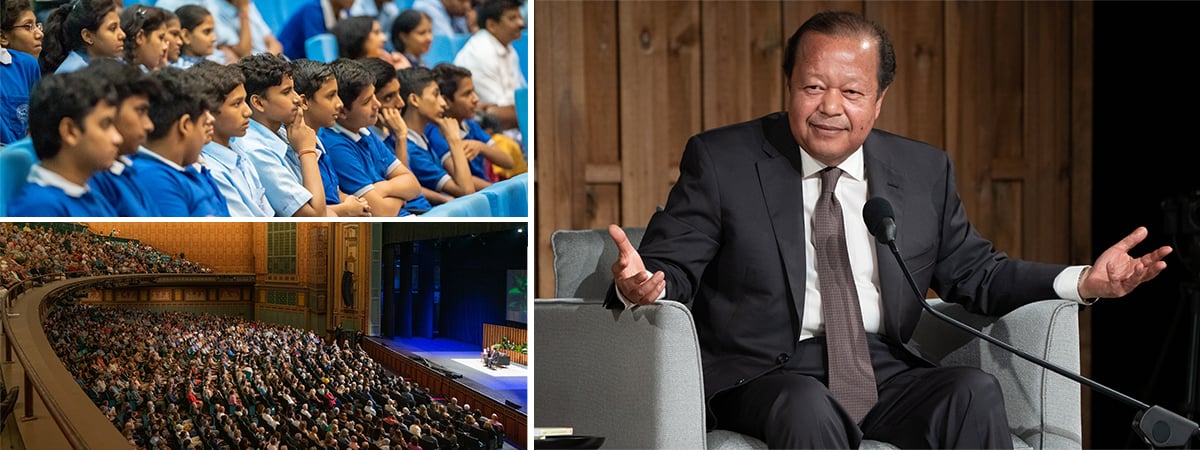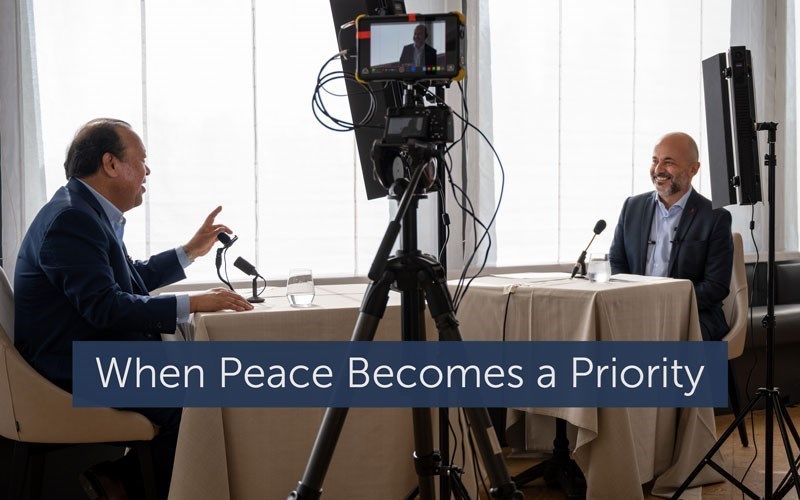 00:46:50
When Peace Becomes a Priority (Video)
Duration : 00:46:50
Prem Rawat in conversation with Gianluca Fabi of Cusano Italia TV & Radio
00:46:50
When Peace Becomes a Priority (Video)
Duration : 00:46:50
Prem Rawat in conversation with Gianluca Fabi of Cusano Italia TV & Radio
Knowing the true power of a human being is just one of the essential topics discussed in this conversation between Author and Global Peace Ambassador Prem Rawat and Gianluca Fabi of Cusano Italia TV & Radio, Cusano Campus. Rome, Italy Sept 23, 2020
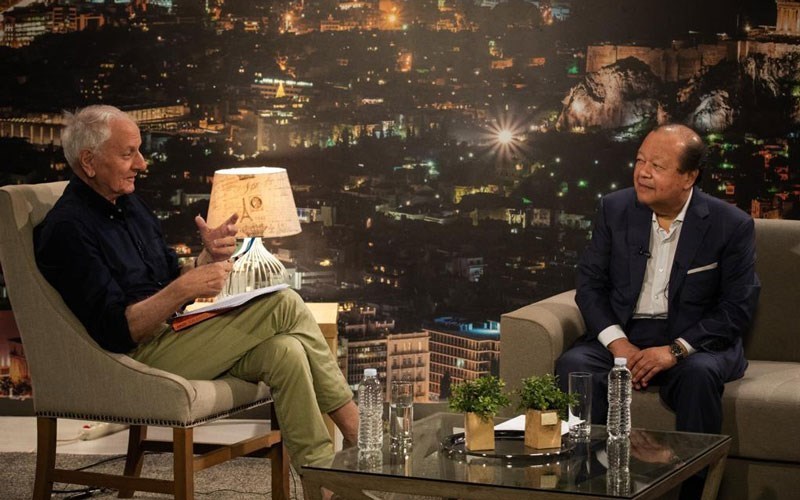 00:32:28
In the ARENA of Life
Duration : 00:32:28
Kostas Hardavellas interviews Prem Rawat for Blue Sky TV station in Greece
00:32:28
In the ARENA of Life
Duration : 00:32:28
Kostas Hardavellas interviews Prem Rawat for Blue Sky TV station in Greece
Onscreen text:
In the ARENA of Life
Interviewer: Kostas Hardavellas
Interviewer: Good evening, ladies and gentlemen. Today’s is a special show. And when the show is over, maybe tonight you will sleep better than you usually do.
Because today, we will help you discover within, what we call “peace, serenity,” and how to lead a better life.
You know very well that from morning till night, we are bombarded with news about the cost of living, or political events, toxic narratives that poison us with worry and mental distress, banks hounding us to repay our loans.
The only thing that can act as an antidote, a shield of protection, is to discover something within ourselves that we perhaps did not know, and that is peace; that is serenity.
So tonight, we have the guide that will take us to discover the peace within ourselves – a very important man and a very important writer of this wonderful book, “Hear Yourself, How to Find Peace in a Noisy World.”
This is the book in Greek, published here in Greece.
It’s really exceptional because it is a guide to help us all to reach this state of calmness.
The author, Mr. Prem Rawat, is with us this evening.
Good evening.
Prem Rawat: Good evening. Thank you.
Interviewer: Congratulations on this book. [Prem: Thank you.]
For this interview, I will be asking my questions in Greek; there will be translation, and this is how we will proceed.
My first question to Mr. Rawat is, “How does his book and its teachings help us?”
Let me also tell you that his lectures include extensive presentations at UNs, addresses to world leaders, as well as settings such as maximum-security prisons.
He presents the way to attain personal peace. So, my question is, “What is the way for us to discover inner peace?”
Prem Rawat: It’s a very complex and yet very simple thing – complex if we don’t understand it, simple if we do understand it.
A long time ago, here in Greece, (and I think it’s very appropriate to talk about this), Socrates says, “Know thyself. Know who you are.” Now, since then, I know there have been myriads of explanations and you know, “What that means,” and “How that needs to be translated” and everything else. [Interviewer: Yes.]
But if we look at it in the simplest, simplest way, “Know thyself” – it is not only Socrates. But there are so many people around the world, from the Americas to India, to so many countries that have mentioned the same thing: “Know thyself.” The treasures of peace, of joy, of happiness that you are looking for are inside of you.”
And we look for it on the outside. We don’t find it; we get frustrated; we say, “Nah, it doesn’t exist; this is not true.” But you have not looked where it is.
Interviewer: When you say “inner peace,” what do you mean? Is it “peace of mind,” or something different?
Prem Rawat: Yes, it is inside of you – the peace, the peace from all the noise of this world, all the indoctrination that a human being goes through, everything that is instilled in us since we were children: “It is this way; it is this way; there is a heaven; there is a hell, and if you’re not careful, you will go here; you will go there!”
Fine! But how do you live every day? How do you exist every day? The craziness of this world is only increasing. We talk about peace and yet wars happen! And we look at world leaders to solve our problems and the problems only get worse.
So, what is it that I am talking about? I’m talking about a refuge from all of that noise, all of that craziness. And coming to inside of you. You being the center of your universe.
Interviewer: Okay. How did you start, and why this effort to discover inner peace?
Prem Rawat: Well, believe it or not, my first discourse was when I was 4 years old. And I went on the stage and I talked: “That what you’re looking for is inside of you.” This is how it began for me. I saw that people wanted something, a higher aspiration, a greater aspiration.
Not just a success in this world, but success in their own lives, success in their own beings, success as a human being – that one person that makes the journey from birth to death. Not the person that goes from one job to another job to another job – and somebody else will be doing that job after that person is gone.
But you, me, the human being. That to have that aspiration fulfilled will require a person to have that peace in their lives. And I wanted to turn their attention to themselves, instead of everything else.
Because this is what we do! Our attention is just somewhere else, somewhere else, somewhere else. Where, you know, we are looking for the Divine: “Where is the Divine?” “Oh, it’s way over there.” And nobody looks at themselves.
And yet, you will find happiness inside of you; you will find joy inside of you; you will find the Divine inside of you. You can come up with 10,000 theories of where it is, “Maybe it’s over there; maybe it’s over there; it’s this; it’s that.” But that’s okay! It’s okay to have the 10,000 theories, so far you know the real address! The real address.
Interviewer: I can sense, detect a feeling of peace in your face, an infinite peace. Have you yourself discovered this peace within yourself, and how does it help you in your life?
Prem Rawat: When I am in touch with myself, yes, there is inner peace for me. Will the outside world change for me? I don’t know. But I have a place that I can call “home” I have found inside of me.
Does that mean my problems go away? No! No! That doesn’t mean that. When you paint your house white, that doesn’t mean every single house on the street is going to be white. Only yours is going to be white, and whoever else paints their house white, their house will be white. If somebody paints it brown? It’ll be brown.
It is so simple, because it is ... This is the way it has been for so long on the face of this Earth. We come up and we say, “Oh, look, I have a new way of saying this.” No-no-no, no. What you are looking at has been on the face of this Earth for a really, really, really long time.
You know, I came to Greece a long time ago, and I went to see the Parthenon. Now, there are people who come to Greece, and it’s the first time they see the Parthenon. [Interviewer: Yes.]
You know, and I’ve seen it. I have seen it a long time ago when it was totally different. It was different because there was so much more debris that was all around it, and now they’ve cleaned it up a little bit, and it’s going through these transformations.
But it’s still there! It is still there! It’s not like ... And when I look at it, I can just go, “Oh, and there it is, the Parthenon.” And the first time, I climbed up, went up there, this, that, “Ah, the Parthenon,” the fascination of it.
But what is the fascination when you are searching for that that is as ancient as it gets?
Interviewer: Yes. So ...
This is the book. Let me say once again, “Hear Yourself: How to Find Peace in a Noisy World,” by Prem Rawat. I will read something very interesting on the back cover.
It says, “Peace is not an idea. It is not something to be discovered from a passage written in the pages of an ancient book, hidden on a secret shelf in a strange building, in an obscure place up a mountain shrouded in mist.
Peace is found in people, not in things. It is in you. And it is there to be sensed, felt, experienced, treasured and celebrated.”
Very nice words! So, I want to ask, “What does this book say and how does it help us to achieve this goal that you are proposing to us?”
Prem Rawat: Yes, because this book is really full of my observations, the things that I’ve seen in my life. And things that I have seen that people are not looking at – the obviousness of it, that they’re not looking at themselves. They’re not ...
You know, it’s easy – when you have the noise on the outside, you can get earplugs and you can put them in. But people don’t understand what it is like when the noise is in between your ears. How do you silence that?
And that noise is the noise that will not let you sleep at night. That is the noise that will not let you listen to your own children – that will not let you listen to your own wife. Your own people that you love, it blocks you off! Because you’re listening to a noise – and a noise that has been there for such a long time for you. And I want to change that.
Interviewer: You have been talking about peace continuously over the past 60 years. What inspires you to continue this endeavor for so many years?
Prem Rawat: It is when I watch people, and they feel that peace in their life. You know? When you look at this, I reached – 325,000 people have gone through the Peace Education Program. I was just in South Africa, and I saw people going through it.
And when people get in touch with that, when it makes sense to them, they light up. And to watch a flower unfold. And of all – you know, flowers are beautiful. But when a human being unfolds, it is the most magnificent flower that there is. And I would love to watch human beings unfold in joy.
Interviewer: Somewhere in the book, you write: “Open up to what your inner self is saying.” Have you listened to yourself and what does your inner self say to you?
Prem Rawat: Yes, I have heard myself. And what I have said to myself inside is “What you are looking for is in you. Rejoice. Today is your day. Today is your moment. This moment that you have will not come again.”
Your problems will come again. Things that are on the outside will come again. But this life that you have, this existence you have, it is now. Take most of it, all of it, everything that you can, and make it yours.
We have not made our own lives ours – they’re somebody else’s. I want people to make their lives theirs!
Interviewer: You are talking about an inner self. Is it different from our outer self? Are we different from what we portray on the outside?
Prem Rawat: Yes, the external self is under constant change. The only thing it does is change – change, change, change, change. And we try so hard for it not to change. And the internal self never changes. Never changes because it has no reason to change. But the outside, it changes. And we are so obsessed with the outside not changing that we forget about the inner self.
Interviewer: I am reading your book which I really like, and it has helped me so much to discover myself.
Somewhere in it, you say and show that you put the heart above the mind. I’d like you to explain this to me.
Prem Rawat: Yes, because the mind is susceptible to changes. It’s running around; it’s, one minute it’s in America. One minute, faster than any airplane, and all of a sudden, it’s sitting in South America. It’s sitting in Australia. It’s sitting all over the place. This is its nature of change.
But there is something that you need to be anchored to. When you have a boat, and you want the boat to stay in one place – you don’t want it to go crash in the rocks and everything else – you need to have an anchor.
This heart of a human being has to be your anchor. You have to understand that. That doesn’t mean you don’t go to America; you don’t go to South America; you don’t go to Australia; you don’t have a mind, no! You’re not trying to control it. It is there. But one day, you’re going to need that anchor. And when you do, you’d better know where that is.
And that’s why I give the heart a bigger place than the mind. Because the mind has been there for so many people. But so few have touched their own heart, and have gotten their inspiration from their heart. We get inspired by the mind, but not from the heart.
Interviewer: Yes, I understand.
How can your teachings help with parent-child relationships? Your theories about discovering peace, that is?
Prem Rawat: When we are with our children, we need to listen. Why can’t we listen to our children? Do we not love our children? Of course, we love our children. When we want to talk to our wife, we want to hear her; we need to hear her. But we can’t hear her.
Because already, there is another wife that is talking between the ears. “Dah-dah-dah-dah, dah-dah, dah!” And we go, “Naah, it’s not this way,” and we get – the same thing with the children. “Oh, they need something from me. They want something.” It’s already predetermined.
But that’s not it. Your wife is your partner – your partner. Listen! And the only way you can listen is when you stop talking between your ears. Listen to your children.
This is the problem in this world. Governments don’t listen to people; people don’t listen to the government. The military doesn’t listen to the enemies; the enemies don’t listen to the military. Children don’t listen to their parents; parents don’t listen to their children. This is the same problem in schools; this is the same problem in prisons; this is the same problem everywhere.
And yet, to hear somebody is one thing, (you don’t, you can’t close your ears). But what does it take to listen?! To listen, you have to be silent. Do you know how to be silent? This is what I’m teaching: “Be silent, and you will hear. Be silent and you will hear the Divine calling your name, calling you. Your life calling you, all the beauty calling you to be fulfilled.”
Interviewer: I’ll ask a very simple question here about a personal experience.
In this book, you tell us how to overcome and ignore the distractions of noise, whatever that noise may be.
So, say there is an apartment above my house where there’s usually a lot of commotion that prevents me from sleeping at night.
How will this help me to overcome this problem, or the noise that keeps coming in my head?
Yes, this is very simple.
Prem Rawat: It’s very simple: “Move! Move!” Or find a time that they don’t make noise; then sleep! You can go around these problems any which way. But what you cannot go around is when the “inner neighbor up here” makes noise, and it won’t let you sleep.
You know, this is the funny thing. You listen to your neighbors and you can’t sleep. Yet you can go on a train which is making a lot more noise, and you can sleep. You can go in an airplane, and that’s making a continuous noise, much louder than your neighbors, and you can sleep. [Interviewer: Yes. Yes.]
How is that possible? I’ll tell you! Because you relax and you go to sleep. The outside noise goes away. But when you’re not relaxed, anything will bother you. A train makes more noise than neighbors talking, believe me. An airplane makes more noise.
But then as soon as we relax, we just go to sleep. We don’t care. You know, our mouth might be open; we may be snoring! We don’t even care about the proper etiquette! “What are you doing? You’re in the middle of all these people; you’re sleeping? All these strangers you don’t even know?! And you’re going to go to sleep?”
So, it’s really something about you! It is about you. This inner noise between the ears is really something else; it’s more powerful than you realize.
Interviewer: Umm-hmm.
Now, in your book you talk about “A power that has run through the universe for billions of years. A power that has run through the universe for billions of years.” What do you mean by that and what is this power?
Prem Rawat: It’s the power that causes the sun to rise. It causes the Earth to spin. It causes you to breathe. It causes the wind to blow. It causes the cloud to billow. It causes the moon to come up. It causes the bird to fly. It causes the lion to roar. It is everywhere; it causes the waves; it causes the ocean; it causes everything to be.
Now, we want to give this power a name. Everybody is interested in giving this power a name. I don’t know why! This power was there way before we came up with any language. So, why are we interested in giving it a name?
And the name – as soon as we give it a name, people get divided. And this is what has been happening. Where it should be uniting people – because everybody sees that power; everybody knows about that power; everybody feels that power – it should be uniting everybody.
But it divides everybody because we get more interested in the name than the power! We should be more fascinated with the power than the names we give it. And that’s the power that I talk about. It’s everywhere.
Interviewer: Umm-hmm?
These things we are discussing here, you have also spoken of in maximum-security prisons, in the worst of environments. And from what I’ve read, you have also spoken of this to rebels.
How did this benefit them?
Prem Rawat: Oh, my goodness! So, when you do something wrong, you go in front of the judge; the judge says, “Okay, you’re going to jail.” You go inside the prison. You go through the processing. The door locks, “Brrunnk!” And it’s not quiet; it’s a big door; it locks. You’re behind the bars. And you find yourself in prison.
All of a sudden, you blame the world. You blame the judge for putting you there; you blame the parents for putting you there; you blame your wife for putting you there; you blame your friends for putting you there. You blame the government for putting you there; you blame everybody – [Interviewer: Umm-hmm?] because you don’t know yourself ...
And my message puts them in touch with themselves, and all of a sudden, they realize that they are the reason why they are there. But that’s the good news. Because they can’t change the judge; they can’t change the government; they can’t change the laws; they can’t change the warden – but they can change themselves.
And when they begin to understand that they can change themselves, they actually find hope. And this is what it takes. This is what it takes.
What makes prison a prison?! Is it the metal? Well, you have metal in your house. Is it the windows? You have windows in your house. Is it the cement? You have cement in your house. What makes a prison a prison?
This is what makes prison a prison. And when that liberty is taken away, it is the liberty that you give to somebody, and that is gone!
But that liberty – there is a liberty that you have that nobody can take away from you. There is a wisdom nobody can take away from you. There is a strength nobody can take away from you. You have a treasure nobody can steal from you.
And unless you know that treasure, and have access to that treasure, you will truly never be rich. This is what they discover in prison. This is the importance of that message.
Interviewer: Umm-hmm.
I guess one has to want to discover this inner peace – that it cannot be forced: “Do this.”
Are there cases where people didn’t want to discover inner peace, and why?
Prem Rawat: Well, yes, of course! Of course, people – it’s, you know, there are people in this world – you could find a person who is so thirsty that they’re dying for water; you offer them water and they go, “Yes, I want it.” Then there are other people, “You want some water?” “No, I don’t need it; it’s okay.”
So, yes, of course. Because until you recognize your thirst, unless you recognize your hunger, you cannot say “yes” to food; you cannot say “yes” to water. And that recognition is extremely important, and that’s why the book! That’s why this interview; that’s why I’m talking to you – so that people can hear!
And perhaps, perhaps, they can go, “Hmm! Maybe what he is saying is true. Maybe what he’s saying makes sense.”
If it doesn’t, fine! I am not saying “You’re going to go to hell,” or “You’re going to go to heaven.” I am saying that hell is here, and heaven is here too. You don’t have to “go there.” Either you are in heaven, or you are in hell! And if you don’t understand, it’s going to be pretty hellish. And this is the way people look at this world: “Why me; why me; why me?”
And then? There is heaven. And what is heaven? It is not about the clouds, and it is not about your relatives. But it is about you being in that peace, joy and contentment.
Interviewer: You know, the Greek people have been suffering so much in recent years due to financial crises, so on and so forth.
Can what you are suggesting be taught en masse, or should it be through a one-on-one meeting?
Prem Rawat: Well, what I’m trying to convey to people, it is a very personal experience. It is not objective; it is subjective. And you know, it is something you – nobody can say, “Now you have peace. You have gone through this course and now you have peace.”
No! Either you do – if you don’t feel it, then you don’t feel it. And so, this is very, very important, you know, because in the world, people say, “Go through this course and you’ll graduate. You know, if you got 87% on your test, you pass.” Even though nobody says, “Do you understand any of this?”
And this is what’s important! Yes, you have to understand it. If you don’t understand it; if you don’t feel it, it doesn’t make sense. And if it doesn’t make sense, it doesn’t make sense. It’s as simple as that.
Interviewer: Are you a happy man yourself? And how did you discover this happiness?
Prem Rawat: When I am in touch with that place inside of me, I am happy. That doesn’t mean I am always in touch. Yes, there are things that happen – that I am not happy. And then I have to remember that place inside of me. Then I have to remember that there is something more than what is going on. And then I am happy.
My happiness is as much as, if I go in front of the ocean. I mean, imagine how much water there is in the ocean – and if I only put my finger in the ocean, only my finger will get wet. Nothing else. Nothing else. “Can this ocean not just make me wet?” Of course it can. But however much I submerge of myself, then that is what will get wet.
It is up to me! The ocean has the capacity to completely cover me up with water. But how much do I submerge of myself in that ocean?
Interviewer: In closing, what advice would you like to give to people?
Beyond all the things you said in the book, what do you have to say to people? What message do you want to convey?
Prem Rawat: What I would like to say to everyone is, “Regardless of what happens in your life, you are very fortunate to be alive. You must do everything in your power to accept that good fortune that you have been given,” with me, without me, I don’t care.
I’m not saying this book is the solution. You are the solution. You are the problem; you are the solution. You are the candle, and you are the candle that needs to be lit. And if you are, you can light thousands of candles. This is the principle that has been: “An unlit candle cannot light another candle. But a lit candle can light another candle.”
Light yourself. You will light up your family; you will light up those you love. How beautiful this world would be, not in darkness but in light, because there are so many lit candles on the face of this Earth.
Interviewer: It has been a very beautiful evening.
This man has transmitted to us, beyond his messages, a real peace. I feel it myself, and I would even say that this book will help you a lot.
Take it with you this summer and read it on the beach.
“Hear Yourself” because we need to listen to our own self sometimes, because we have our own voice. “How to Find Peace in a Noisy World,” Eleftheroudakis publications.
Very useful, very useful.
Thank you very much. And congratulations on this book.
Prem Rawat: Thank you. Thank you. Thank you for having me. It’s a pleasure to be here.
Interviewer: Thank you very much for watching us. I hope you had a good time tonight too, and you learned things.
Maybe, as I said at the beginning, tonight we’ll sleep a little better after hearing this.
Goodnight.
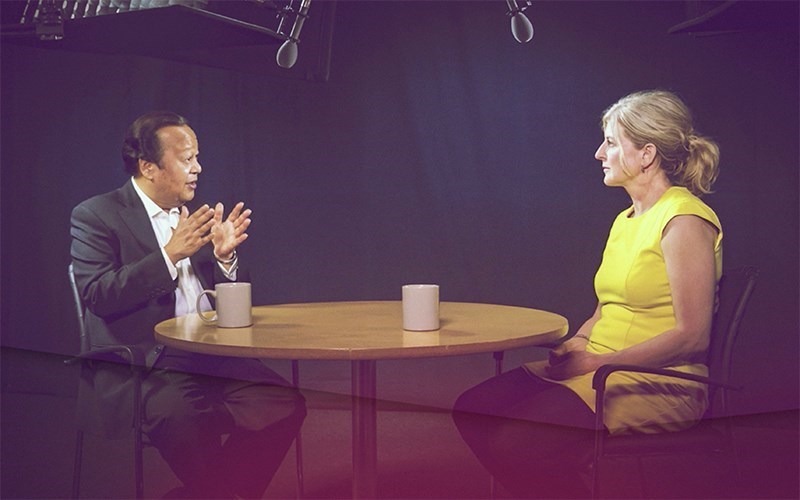 00:09:21
A Voice for Peace
Duration : 00:09:21
We need to help each other, not get in each others’ way.
00:09:21
A Voice for Peace
Duration : 00:09:21
We need to help each other, not get in each others’ way.
Helle Solvang:
So, Mr. Prem Rawat, I’m doing this language laboratory program in the Danish radio. It’s a weekly magazine where my main focus is to try and discover how language can change people and how we can change ourselves and our surroundings through language.
Prem Rawat:
Well, first of all, thank you very much for having me on this show. And what I have learned is, language, or whatever we use to communicate—we need to communicate; we have a need to communicate. And sometimes people don’t see the need—that they need to communicate.
I mean, in this world today, there are obviously those people who believe in peace and who want peace to be there. When you look at all these wars going on, it is the innocent victims who had nothing to do with making those decisions, who are getting punished. And if they could say something, what would that be?
And that, to me, would establish the need—but they don’t have a voice. And to me it’s like, no, there has to be the voice of need that needs to be the loudest for humanity, the need to be in peace, the need to prosper, the need to be content, the need to be fulfilled.
And just, the need to live a life that they feel is good, that they can be; they can practice their religion; they can practice their faith; they can practice their understanding and have a path that they can go on, that can allow them to better themselves. This is the need, and we need to help each other, not get in each others’ way.
So, taking away that greed and taking away differences and starting to see the similarity, that’s the vision of clarity; that is the voice of clarity, and that is the voice of peace.
Helle Solvang:
Concerning the “voice of peace,” and the “language of peace” that we’ve been weaving around here, you’ve been traveling through so many countries and visiting so many cultures—you’ve got them under your skin. Are there any languages or any cultures in the world that you would say have peace as their core foundation?
Prem Rawat:
I think all of them do. The idea of peace, the feeling of peace, the need for peace, the want for peace has been there with us all along. The better half of a human being is peace. And I think that all cultures do give rise to that—you know, do give credence to that.
“Shalom! Salaam!” Peace! To greet a person by saying, “Peace. May peace be with you.” And this is coming from some of the regions that have been fighting with each other for such a long time! And yet, the first word uttered to greet another human being is “peace.”
I think we want peace, you know? But that voice is so dim now, overshadowed by the noise of greed and arrogance and anger and fear... I mean, so many politicians, they use fear! Fear—“But you don’t do this, then this will happen. And, don’t you, you know, and”—fear!
Give people information; let people make up their mind. Give people information! Don’t manipulate their emotions. Give them information, because I think people are intelligent and will make the intelligent choice.
Helle Solvang:
When I listen to you, I also think sometimes that there’s a heavy load on each individual—the force or the need to change and transform into a better environmentalist, into a more peaceful person, and to be talking in a more peaceful language.
So, how much of the peace and prosperity and of our survival in this world is based on the individual changing and transforming—and how much on systems changing and performing?
Prem Rawat:
That’s a really, really good question. Because, when you were asking that, I was just thinking in my own head, “Is ‘being green’ normal, natural, real? Or is it something that we have to change for?”
So, being green, does that mean...? Is that a deviation? Or, is it coming back to the track where you should have been all along? Being kind, is that a deviation, or is that where you should have been all along?
So, when you start to look at, “That yes, this takes effort”—but it’s only because we have already deviated. And this exercise is not about deviating further, but it’s coming back to where you should be, being human. That’s being human.
And I think that having generosity, having clarity, having kindness, having good choices is normal. And where we are, where it’s anger, it’s fear, it’s, “Destroy nature, capture nature, arrest nature, tame nature,” I think that’s deviated. Because you can work with nature—and she will work with you. Or you can be saying, “I want to tame you”—and she will tame you.
That change that really needs to happen is about understanding who we are—not looking at our differences, but our similarities. And, that in fact, if we all came together—not everyone has to come together—enough of us have to come together—it is, you know, the mass.
Enough of the mass comes together where the greedy become a true minority. And those people who truly understand generosity, acceptance of a human being, acceptance of what we have on this earth—that’s generosity. And I think something amazing is going to happen, amazing is going to happen.
But those who need that voice don’t have it! Because they are like, “No, don’t say anything.” And I think everybody needs to come together and say, “No, say it. Say it.” Say you are alive; say you are here; say you want heaven here—and I think amazing things will happen.
Helle Solvang:
Thank you.
Prem Rawat:
It’s been a pleasure.
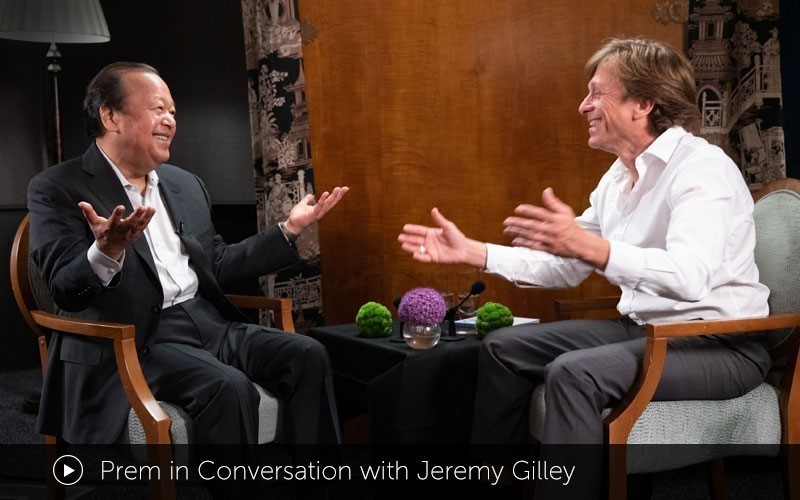 00:03:57
Prem in Conversation with Jeremy Gilley
Duration : 00:03:57
Love Like There’s No Tomorrow
00:03:57
Prem in Conversation with Jeremy Gilley
Duration : 00:03:57
Love Like There’s No Tomorrow
Jeremy Gilley:
Can I just talk to you about a couple of things, then, just to help me—and maybe it helps some others. Can you just talk to me a little bit about the importance of family?
And, when I think about the world and I think about peace, I think about my family. And if my family’s together and if we can do that on a global scale, then we’d sort of create world peace.
Can you just tell me about the importance of us really holding ourselves together?
Prem Rawat:
Well, a family is that unit that’s a bumper in the front, so when a blow comes, it can soften it. The family is the nourishing, nurturing—somebody who can understand when nobody else will understand you—more than your friends.
And obviously, somebody who can give you advice, even at the peril of your anger, and give you good advice.
A family is you in another form. It's like, not just one flower, but a tree that flowers—that's a family. Look at the nature. It's not about just one flower. A plant will not just be satisfied with one flower—another one, another one, another one, another one, and before you know it, it's a family.
And its mission, its job, its purpose, whatever it is in this world, will be fulfilled far greater and far more beautifully when it is flowering, and there are a whole bunch of flowers on that plant, not just one flower.
Jeremy Gilley:
Yeah. Amazing, amazing. And that, on Peace Day 21st of September, one of the things that we've always said is like, "You know, well, what can I do?"
I'm like, "Well, you know, bring the family together. You know, bring the family together; be one on that day" with the sort of global family, and also the ones that we have. And so, hopefully, we’ll see a lot of that, you know, going on on the day.
So, a little bit about love. And I was sort of just thinking at the weekend, you know. I was with my little girl, I just adore her, right? My entire existence, nothing comes first.
You know, when I'm with her, there's no— it's about Rose; it's not about the work, right? It has to be, and it has to be that way for me, and I love it.
How do I contain it, you know? I mean, I love her so much. I kind of just sort of want to do everything. I mean, have you ever sort of felt that?
Have you—if you have any sort of words of wisdom for us, you know, both in terms of personal relationships or with family relationships? When you love so much, you know, it can kind of almost sometimes be too much.
Prem Rawat:
It never is.
Jeremy Gilley: It never is? Okay, great.
Prem Rawat:
It never can be. It can never be. Stop thinking; start loving. Don't think about love. Feel the love in your life. It's a gift. It always won’t be the same. It won't.
It changes. You will change, and one day you won't be here. So, love like there is no tomorrow. Stop thinking about what it all means; start loving. If we did that, this world would be a different place today.
Jeremy Gilley:
Fantastic.
Onscreen text:
The world would be a different place today.
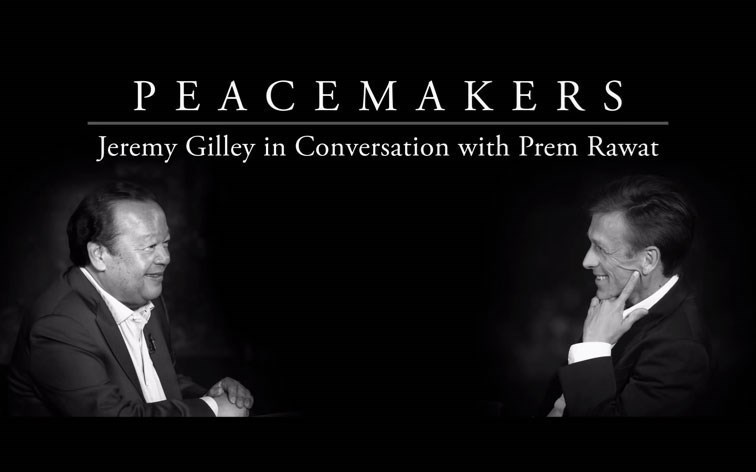 01:05:26
Peacemakers 1
Duration : 01:05:26
Jeremy Gilley, founder of Peace One Day in Conversation with Prem Rawat
01:05:26
Peacemakers 1
Duration : 01:05:26
Jeremy Gilley, founder of Peace One Day in Conversation with Prem Rawat
An excerpt:
Jeremy Gilley:
Can I just talk to you about a couple of things, then, just to help me—and maybe it helps some others. Can you just talk to me a little bit about the importance of family?
And, when I think about the world and I think about peace, I think about my family. And if my family’s together and if we can do that on a global scale, then we’d sort of create world peace.
Can you just tell me about the importance of us really holding ourselves together?
Prem Rawat:
Well, a family is that unit that’s a bumper in the front, so when a blow comes, it can soften it. The family is the nourishing, nurturing—somebody who can understand when nobody else will understand you—more than your friends.
And obviously, somebody who can give you advice, even at the peril of your anger, and give you good advice.
A family is you in another form. It's like, not just one flower, but a tree that flowers—that's a family. Look at the nature. It's not about just one flower. A plant will not just be satisfied with one flower—another one, another one, another one, another one, and before you know it, it's a family.
And its mission, its job, its purpose, whatever it is in this world, will be fulfilled far greater and far more beautifully when it is flowering, and there are a whole bunch of flowers on that plant, not just one flower.
Jeremy Gilley:
Yeah. Amazing, amazing. And that, on Peace Day 21st of September, one of the things that we've always said is like, "You know, well, what can I do?"
I'm like, "Well, you know, bring the family together. You know, bring the family together; be one on that day" with the sort of global family, and also the ones that we have. And so, hopefully, we’ll see a lot of that, you know, going on on the day.
So, a little bit about love. And I was sort of just thinking at the weekend, you know. I was with my little girl, I just adore her, right? My entire existence, nothing comes first.
You know, when I'm with her, there's no— it's about Rose; it's not about the work, right? It has to be, and it has to be that way for me, and I love it.
How do I contain it, you know? I mean, I love her so much. I kind of just sort of want to do everything. I mean, have you ever sort of felt that?
Have you—if you have any sort of words of wisdom for us, you know, both in terms of personal relationships or with family relationships? When you love so much, you know, it can kind of almost sometimes be too much.
Prem Rawat:
It never is.
Jeremy Gilley: It never is? Okay, great.
Prem Rawat:
It never can be. It can never be. Stop thinking; start loving. Don't think about love. Feel the love in your life. It's a gift. It always won’t be the same. It won't.
It changes. You will change, and one day you won't be here. So, love like there is no tomorrow. Stop thinking about what it all means; start loving. If we did that, this world would be a different place today.
Jeremy Gilley:
Fantastic.
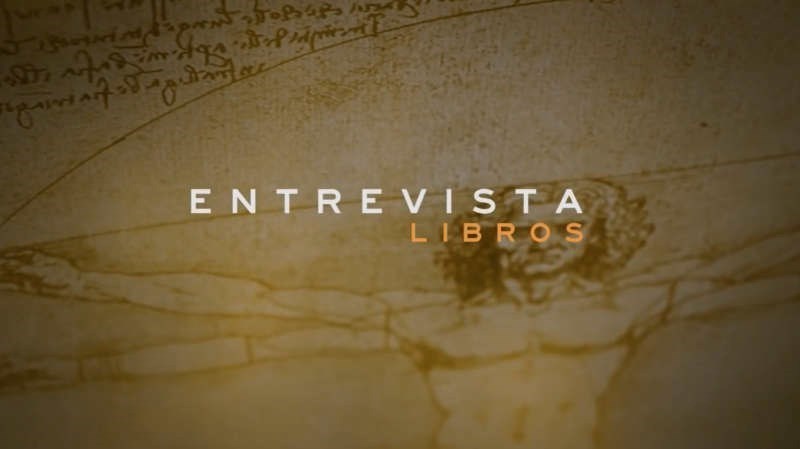 00:15:21
Entrevista Libros
Duration : 00:15:21
An ambassador of peace is someone who wants peace for everyone.
00:15:21
Entrevista Libros
Duration : 00:15:21
An ambassador of peace is someone who wants peace for everyone.




